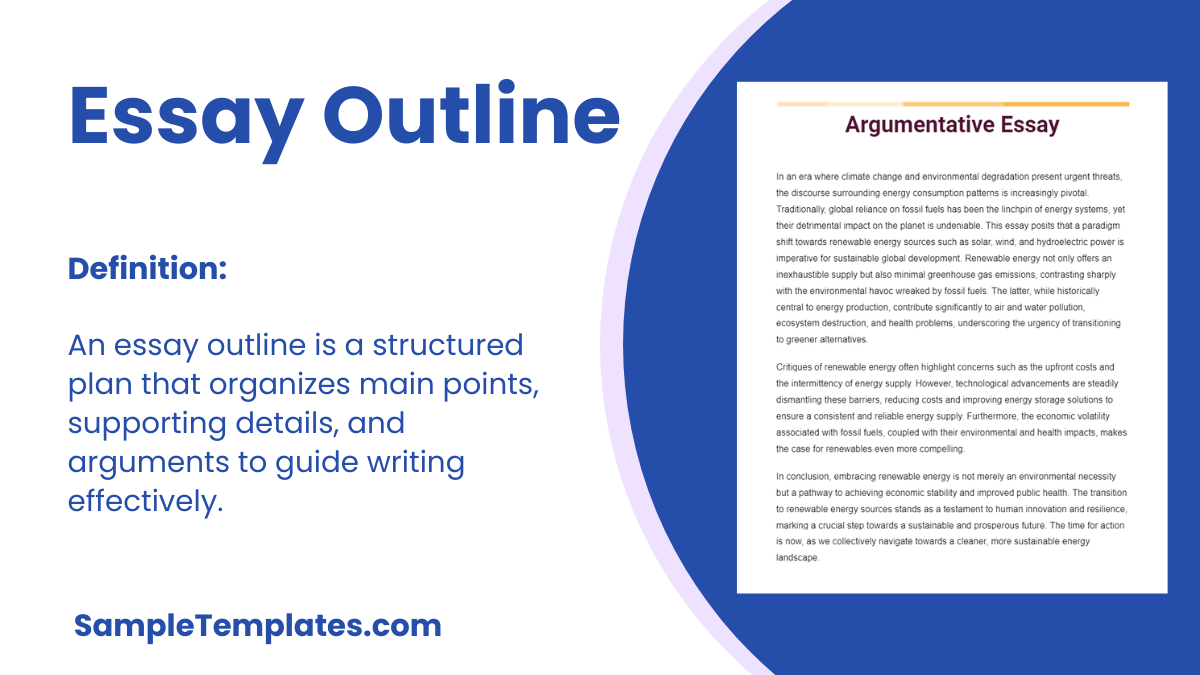Essays are the most common type of prose one encounters in their lifetimes. Although the use of essay writing is usually seen in the field of academics and schooling. Writing essays can be a powerful tool for anybody who wishes to express their views or emotions on a given topic. As it covers a lot of topics and writing styles, the word “essay” can cover school essays as well as doctoral treatises. The following is a list of Essay Samples.
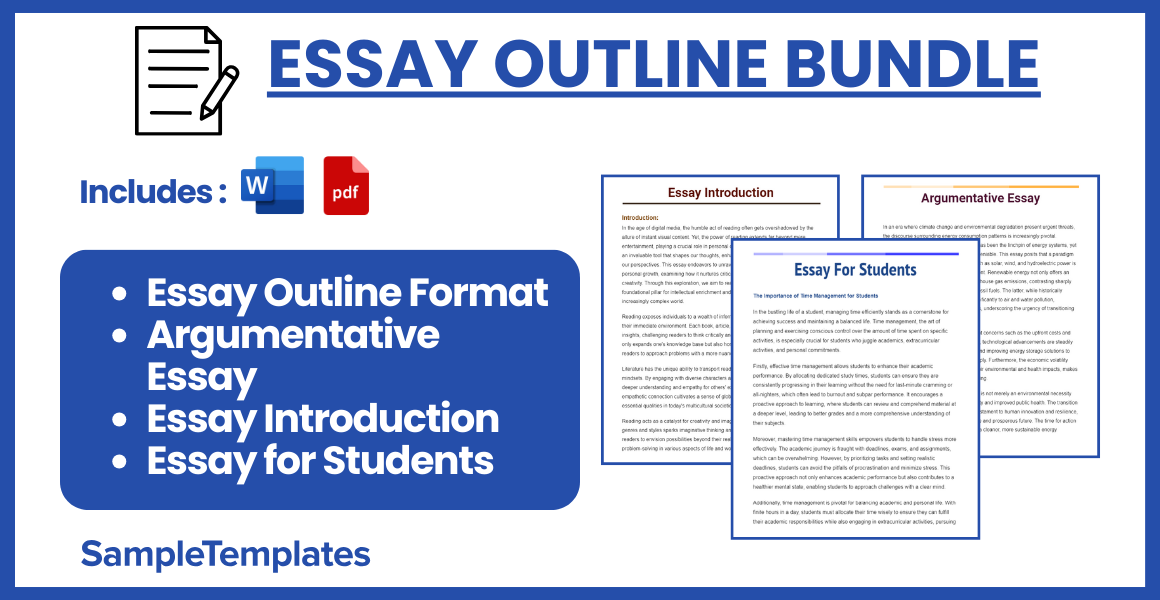
Essay Outline Format
Title of the Essay
I. Introduction
- A. Hook: Capture the reader’s interest with a compelling opening sentence.
- B. Background Information: Briefly introduce the context or background of the topic.
- C. Thesis Statement: Clearly state the main argument or purpose of the essay.
II. Body Paragraphs
- A. Body Paragraph 1
- 1. Topic Sentence: Introduce the main idea of the paragraph.
- 2. Evidence: Provide supporting facts, quotes, statistics, or examples.
- 3. Explanation: Explain how the evidence supports the topic sentence.
- 4. Transition: Lead into the next paragraph.
- B. Body Paragraph 2
- 1. Topic Sentence: Introduce the main idea of the paragraph.
- 2. Evidence: Provide supporting facts, quotes, statistics, or examples.
- 3. Explanation: Explain how the evidence supports the topic sentence.
- 4. Transition: Lead into the next paragraph.
- C. Body Paragraph 3
- 1. Topic Sentence: Introduce the main idea of the paragraph.
- 2. Evidence: Provide supporting facts, quotes, statistics, or examples.
- 3. Explanation: Explain how the evidence supports the topic sentence.
- 4. Transition: Prepare for the conclusion.
III. Conclusion
- A. Summary of Main Points: Briefly recap the main points of your essay.
- B. Restatement of Thesis: Restate your thesis in light of the evidence you’ve provided.
- C. Closing Thought: Leave the reader with a final thought or call to action.
This outline format can be adjusted depending on the essay requirements and the number of points you need to discuss.
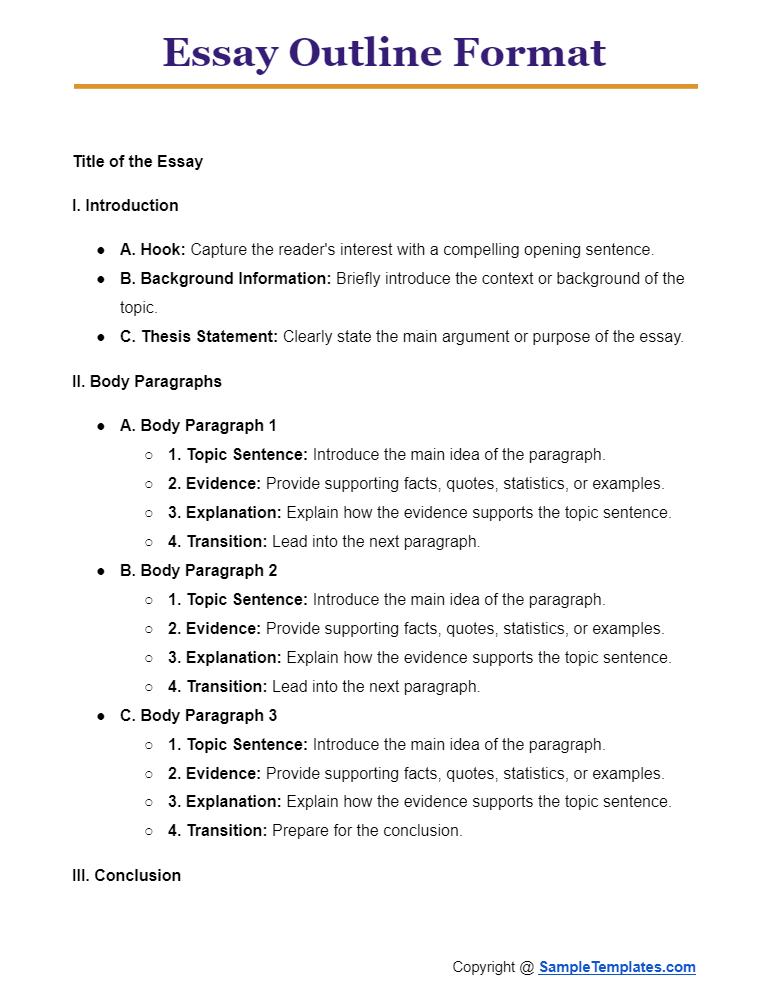
Argumentative Essay
In an era where climate change and environmental degradation present urgent threats, the discourse surrounding energy consumption patterns is increasingly pivotal. Traditionally, global reliance on fossil fuels has been the linchpin of energy systems, yet their detrimental impact on the planet is undeniable. This essay posits that a paradigm shift towards renewable energy sources such as solar, wind, and hydroelectric power is imperative for sustainable global development. Renewable energy not only offers an inexhaustible supply but also minimal greenhouse gas emissions, contrasting sharply with the environmental havoc wreaked by fossil fuels. The latter, while historically central to energy production, contribute significantly to air and water pollution, ecosystem destruction, and health problems, underscoring the urgency of transitioning to greener alternatives.
Critiques of renewable energy often highlight concerns such as the upfront costs and the intermittency of energy supply. However, technological advancements are steadily dismantling these barriers, reducing costs and improving energy storage solutions to ensure a consistent and reliable energy supply. Furthermore, the economic volatility associated with fossil fuels, coupled with their environmental and health impacts, makes the case for renewables even more compelling.
In conclusion, embracing renewable energy is not merely an environmental necessity but a pathway to achieving economic stability and improved public health. The transition to renewable energy sources stands as a testament to human innovation and resilience, marking a crucial step towards a sustainable and prosperous future. The time for action is now, as we collectively navigate towards a cleaner, more sustainable energy landscape
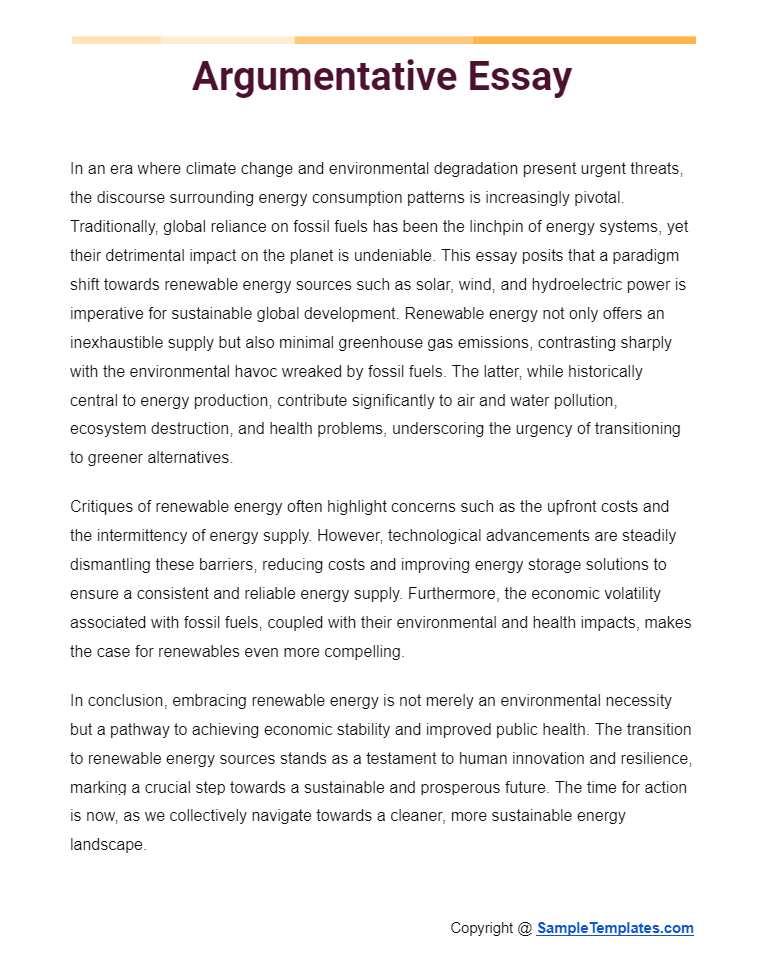
Essay Introduction
Introduction:
In the age of digital media, the humble act of reading often gets overshadowed by the allure of instant visual content. Yet, the power of reading extends far beyond mere entertainment, playing a crucial role in personal development and lifelong learning. It is an invaluable tool that shapes our thoughts, enhances our knowledge, and broadens our perspectives. This essay endeavors to unravel the multifaceted impact of reading on personal growth, examining how it nurtures critical thinking, fosters empathy, and fuels creativity. Through this exploration, we aim to reaffirm the significance of reading as a foundational pillar for intellectual enrichment and emotional intelligence in an increasingly complex world.
Reading exposes individuals to a wealth of information, ideas, and experiences beyond their immediate environment. Each book, article, or piece of literature offers new insights, challenging readers to think critically and analyze information. This process not only expands one’s knowledge base but also hones critical thinking skills, enabling readers to approach problems with a more nuanced and informed perspective.
Literature has the unique ability to transport readers into different worlds, lives, and mindsets. By engaging with diverse characters and narratives, readers develop a deeper understanding and empathy for others’ experiences and viewpoints. This empathetic connection cultivates a sense of global awareness and compassion, essential qualities in today’s multicultural societies.
Reading acts as a catalyst for creativity and imagination. Immersing oneself in different genres and styles sparks imaginative thinking and inspires new ideas. It encourages readers to envision possibilities beyond their reality, driving innovation and creative problem-solving in various aspects of life and work.
Conclusion:
The act of reading wields the power to transform lives through personal development. It enriches the mind, nurtures the soul, and prepares individuals to engage more meaningfully with the world around them. In recognizing the profound impact of reading on enhancing knowledge, fostering empathy, and fueling creativity, we uncover its true value as a lifelong companion in personal growth. As we navigate the complexities of the modern world, let us embrace reading not as an obsolete pastime but as an essential practice for developing a well-rounded, informed, and compassionate self
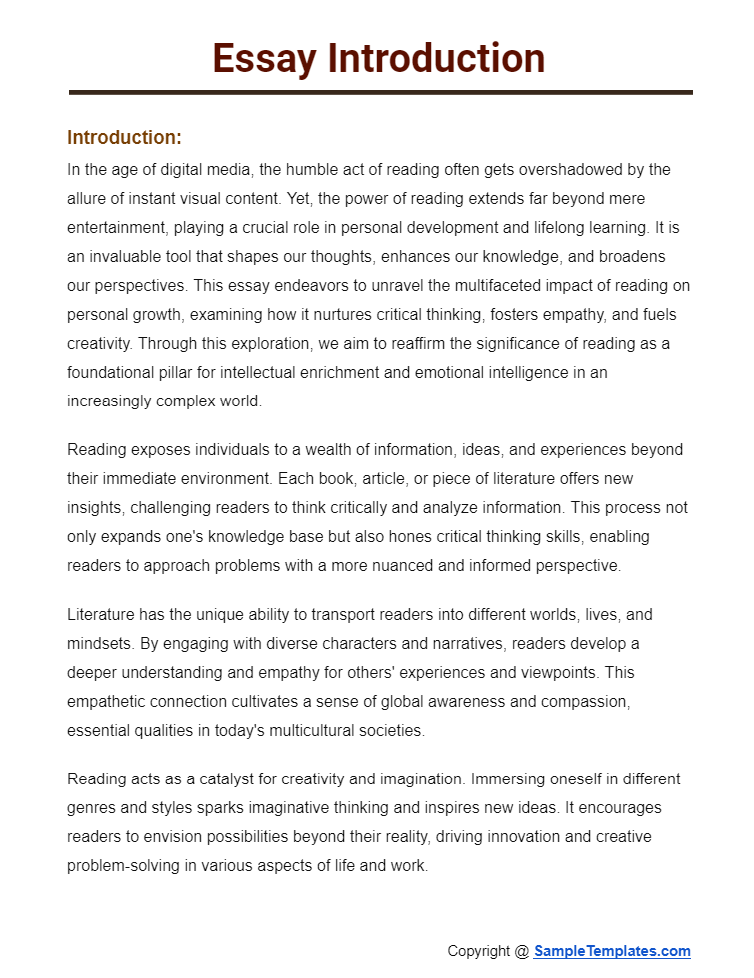
Essay for Students
The Importance of Time Management for Students
In the bustling life of a student, managing time efficiently stands as a cornerstone for achieving success and maintaining a balanced life. Time management, the art of planning and exercising conscious control over the amount of time spent on specific activities, is especially crucial for students who juggle academics, extracurricular activities, and personal commitments.
Firstly, effective time management allows students to enhance their academic performance. By allocating dedicated study times, students can ensure they are consistently progressing in their learning without the need for last-minute cramming or all-nighters, which often lead to burnout and subpar performance. It encourages a proactive approach to learning, where students can review and comprehend material at a deeper level, leading to better grades and a more comprehensive understanding of their subjects.
Moreover, mastering time management skills empowers students to handle stress more effectively. The academic journey is fraught with deadlines, exams, and assignments, which can be overwhelming. However, by prioritizing tasks and setting realistic deadlines, students can avoid the pitfalls of procrastination and minimize stress. This proactive approach not only enhances academic performance but also contributes to a healthier mental state, enabling students to approach challenges with a clear mind.
Additionally, time management is pivotal for balancing academic and personal life. With finite hours in a day, students must allocate their time wisely to ensure they can fulfill their academic responsibilities while also engaging in extracurricular activities, pursuing hobbies, and spending time with family and friends. This balance is essential for maintaining physical and emotional well-being, fostering a sense of fulfillment, and preventing burnout.
Furthermore, the discipline of managing time effectively prepares students for their future careers. The professional world highly values the ability to meet deadlines, manage multiple projects, and work efficiently. The habits formed during one’s academic years lay the groundwork for future success in the workforce.
In conclusion, time management is an invaluable skill for students, pivotal for academic success, stress reduction, and achieving a balanced life. By mastering the art of time management, students not only set themselves up for success in their academic endeavors but also equip themselves with a vital skill for future professional and personal growth. As such, time management should be an integral part of every student’s strategy for success.
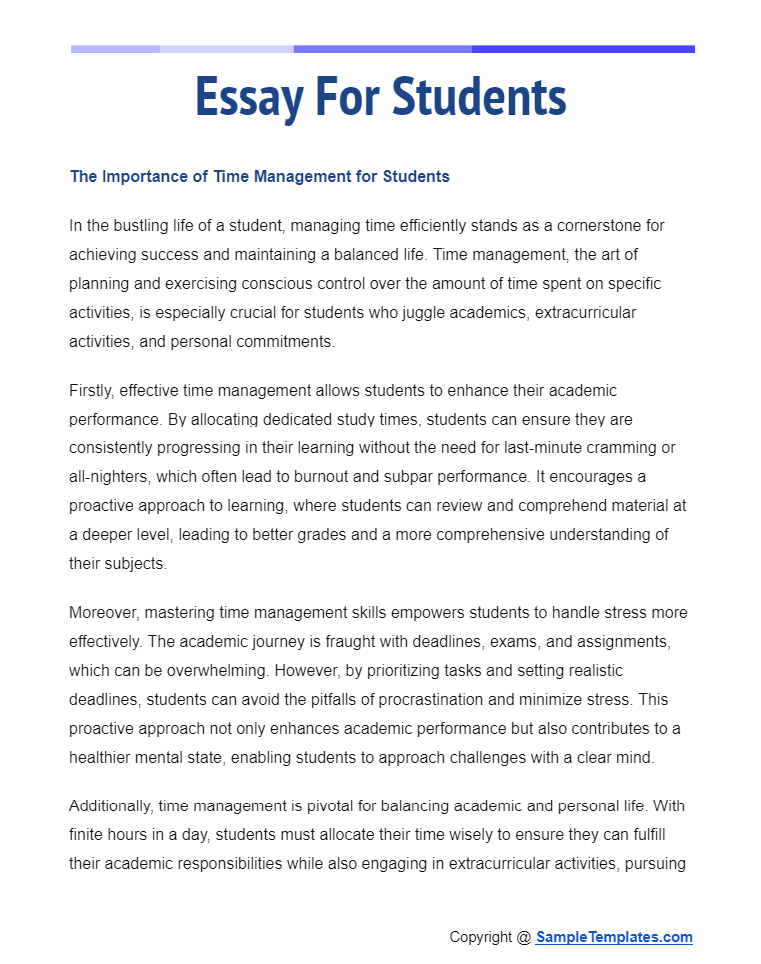
Browse More Templates On Essay Outline
Argumentative Essay Outline Example
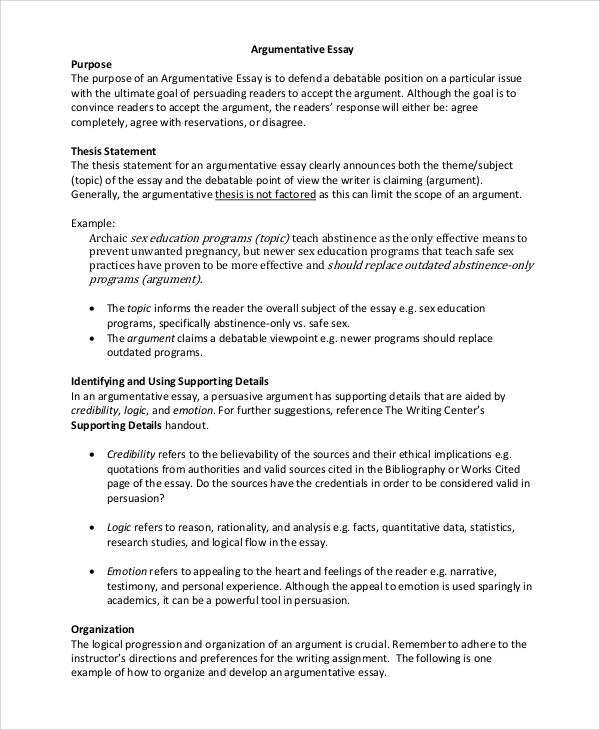
epcc.eduDetails
File Format
Size: 390 KB
DownloadAn Argumentative Essay Examples argues for or against a given topic. The essay includes arguments which should be constructed using credible sources, sound logic and the personal emotions of the author who uses it to persuade the reader.
How do I write my own essay?
Writing your own essay involves several key steps. Here’s a general guide to help you:
- Choose a Topic:
- Select a topic that interests you or one that is assigned to you. Ensure it is specific and relevant.
- Research:
- Gather information from credible sources to support your points. Take notes and organize your thoughts.
- Create an Outline:
- Develop a structure for your essay. Include an introduction, body paragraphs, and a conclusion. Sample Outline your main points.
- Craft an Engaging Introduction:
- Begin with a hook or an interesting fact to grab the reader’s attention. State your thesis, providing an overview of what your essay will cover.
- Write Body Paragraphs:
- Each paragraph should focus on a single idea that supports your thesis. Start with a topic sentence, provide evidence or examples, and conclude with a transitional sentence.
- Maintain Coherence:
- Ensure smooth transitions between paragraphs and ideas. Your essay should flow logically.
- Develop Your Thesis:
- Revisit your thesis statement in the conclusion. Summarize your main points and make a final statement.
- Revise and Edit:
- Review your essay for clarity, coherence, and grammar. Check for spelling and punctuation errors.
- Seek Feedback:
- Ask someone else to read your essay and provide feedback. Fresh perspectives can be valuable.
- Finalize:
- Make any necessary revisions based on sample feedback. Ensure your essay meets any specific requirements.
- Proofread:
- Check your essay one final time for any errors. Pay attention to details and formatting.
- Submit:
- If it’s for a class or publication, submit your essay according to the given instructions.
Remember to tailor your approach to the specific requirements of your assignment or purpose. Practice and feedback will help you improve your essay-writing sample skills over time.
Research Paper Outline Example
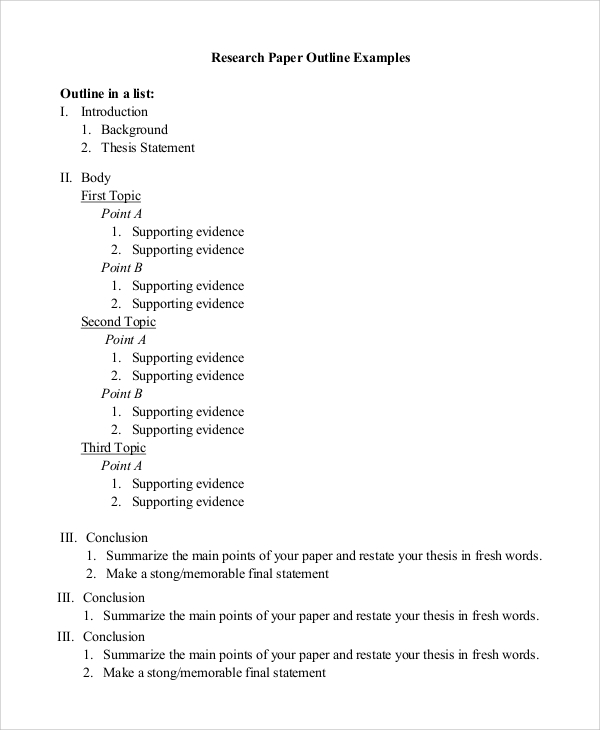
Details
File Format
Size: 169 KB
DownloadA Research Paper Outline Samples is a type of essay where the author researches upon a topic or theme with an academic approach. The research paper should contain citations of sources and should be free of plagiarism.
Types of Essay
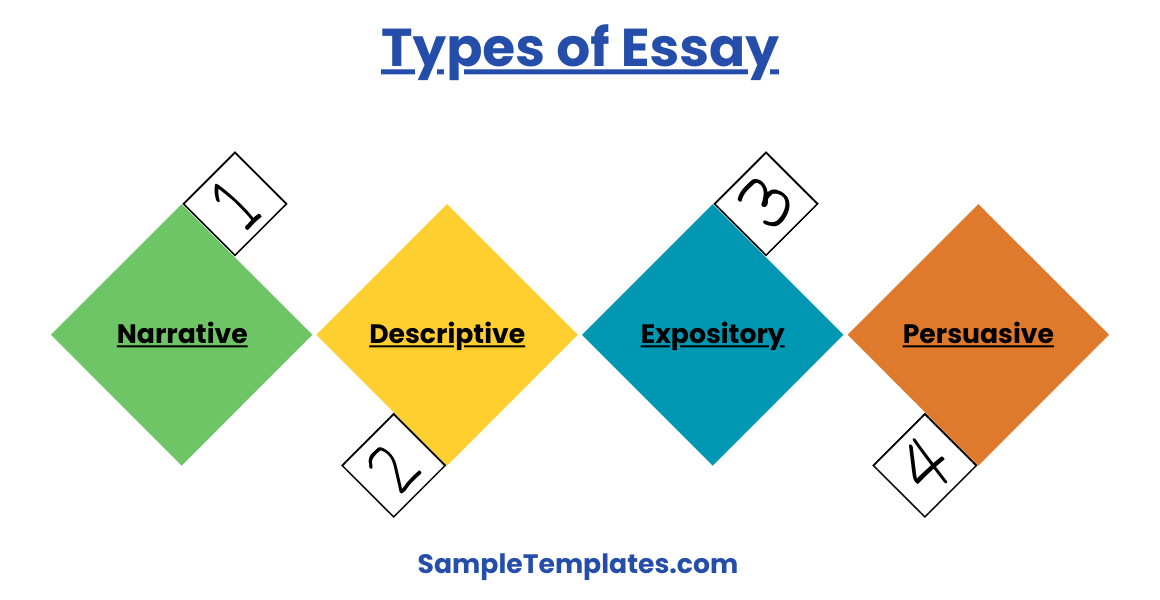
It is said that there are many different types of essays, perhaps a dozen, that are being used today, that is why we can easily get confused with it. Compared to learning about the dozen types of essays, there are actually four major types of essays that cover all the other types. This way you can manage to learn about them easily. The four major types of essays are narrative essays, descriptive essays, expository essays, and persuasive essays.
1. Narrative Essays
When we say narrative, the first thing that comes to our minds are stories. So writing a narrative essay means writing or telling a story. Writing or telling a story is no difficult feat as all of us tell some tale, usually on a daily basis. But what makes a narrative essay different from the storytelling that we are accustomed to is the fact that it should be made interesting and that it should have the capability to involve the reader in the story. Making the story interesting and involving the reader in it as much as possible can be done by writing as clearly and as vividly as possible. The challenge that student writers encounter when making an essay narrative is that it makes them think of things that they can write about themselves. Narrative essays are also written in the first person point of view. It could be their personal characteristics, likes and dislikes, or experiences that are based on real life.
2. Descriptive Essays
Descriptive essays are referred to as essays that paint a picture with the use of colorful words. We can describe a thing or a person the way we usually do, but in a descriptive essay, the description that one gives or writes about something relays a deeper meaning or a much more important interpretation. The words and description being used in a descriptive essay leaves an impression or appeals to the emotions of its readers or audiences.
3. Expository Essays
If the essay you are trying to make is all about facts, then an expository essay is what you need to write. An expository essay is written based only on facts so the personal emotions of the writer should not be shown or revealed in it. Also, when writing about facts, it should only be based on proven and tested sources, like statistics, the definition of the particular topic, and some examples. Under the expository essay type is the how-to type of writing—which provides a process on how to do a particular thing—the cause and effect type of writing, and the comparison and contract type of writing.
4. Persuasive Essays
The last major type of essay is the persuasive essay. In this type of essay, the writer aims to convince the reader or their audience to believe in what they are writing about. The writer’s goal in writing a persuasive essay is to convince the reader or their audience to accept their point of view regarding a particular thing. This is done with the use of facts, examples, logic, and different opinions from experts. It is important that all sides of the argument are presented and clearly communicated in the essay. This is what makes a persuasive essay effective.
Narrative Essay Outline Example
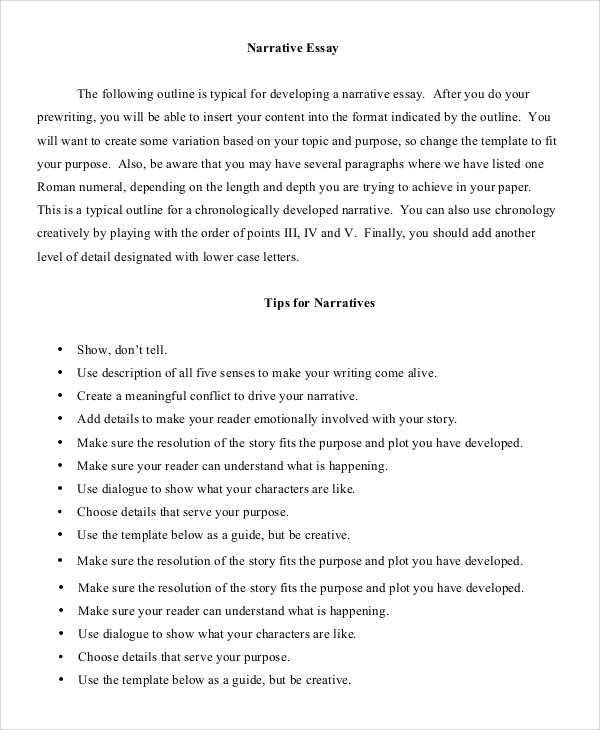
thewritersalley.comDetails
File Format
Size: 70 KB
DownloadA narrative essay is as essay that narrates the personal experiences or thoughts of the writer regarding a certain incident or memory. Such an essay is filled with anecdotes and humor and personal opinions.
Usage of Essay Outline Examples
The sample essay Outline Samples are useful for a large number of people, chiefly those who wish to write an essay on a given topic. Knowing about the outlines and formats for various kinds of essays is a great way to augment the manner in which you wish to state your opinions.
Metaphorically, your words are flesh and blood to the skeletal structure of an essay outline. By adhering to the format of an essay style, you stand the chance of creating a favorable look at your opinions and allow your voice to be heard in words your write.
Expository Essay Outline Sample
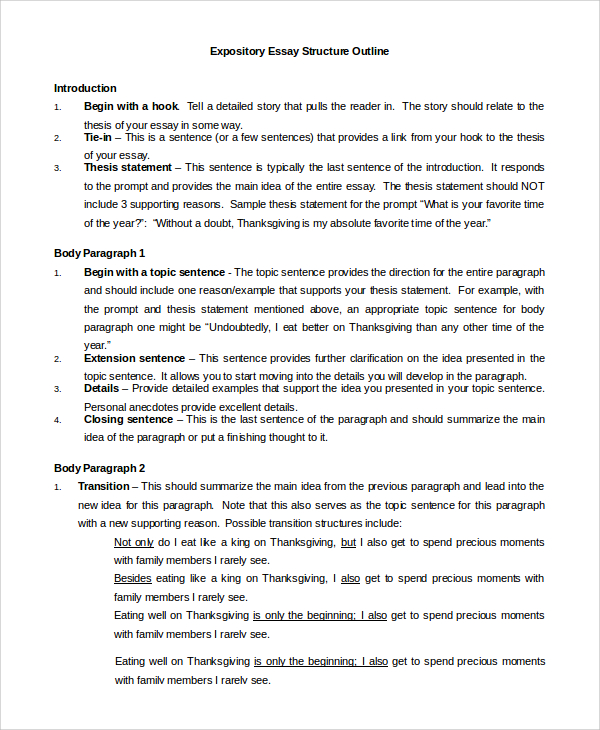
Details
File Format
- DOC
Size: 8 KB
DownloadAn expository essay is a type of essay where the writer shows how to perform certain activities, hence the name “expository”. The essay contains detailed, step-by-step instructions regarding the way an activity is to be performed.
Persuasive Essay Outline Example
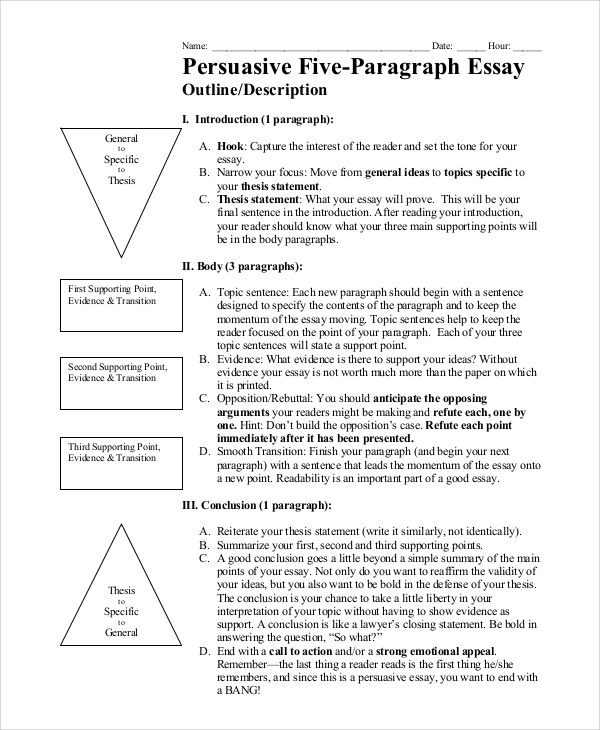
english-zone.com
Details
File Format
Size: 60 KB
DownloadA Persuasive Essay Examples is similar to an argumentative essay, the difference lies in the fact that in this type, the writer seeks to persuade the reader by stating specific arguments and allowing the reader to be persuaded by them.
Essay Outline Worksheet Example
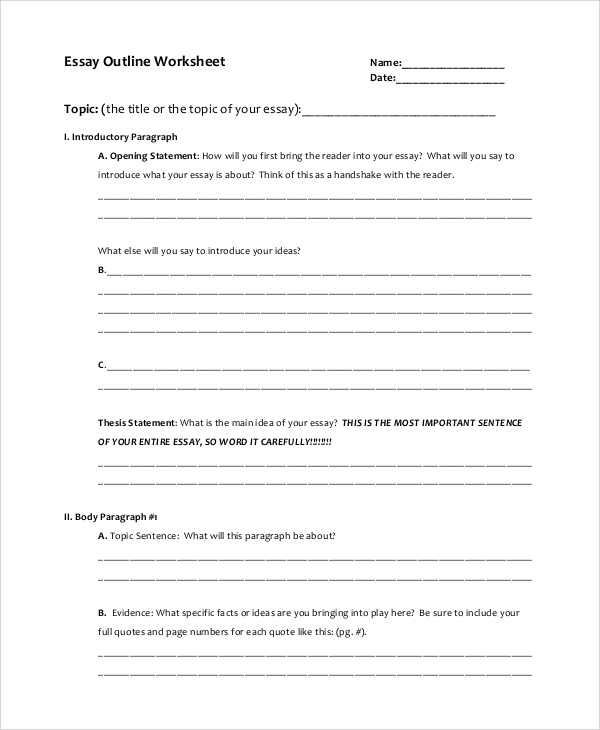
Details
File Format
Size: 40 KB
DownloadTarget Audience for the Essay Outline Examples
The sample essay outlines are targeted towards those individuals who have fluency in written English but who are unable to write an essay because they have no idea how to compose one. In such a scenario, the essay outline templates will readily help them to give them a semblance and basis to write their essays upon.
These Useful Outlines provide a guide for prospective essayists to jot down their opinions and emotions in a manner which appeals to the reader as wells as give shape to the inner workings of the essayist’s mind with regards to a theme or topic.
Tips For Writing an Essay
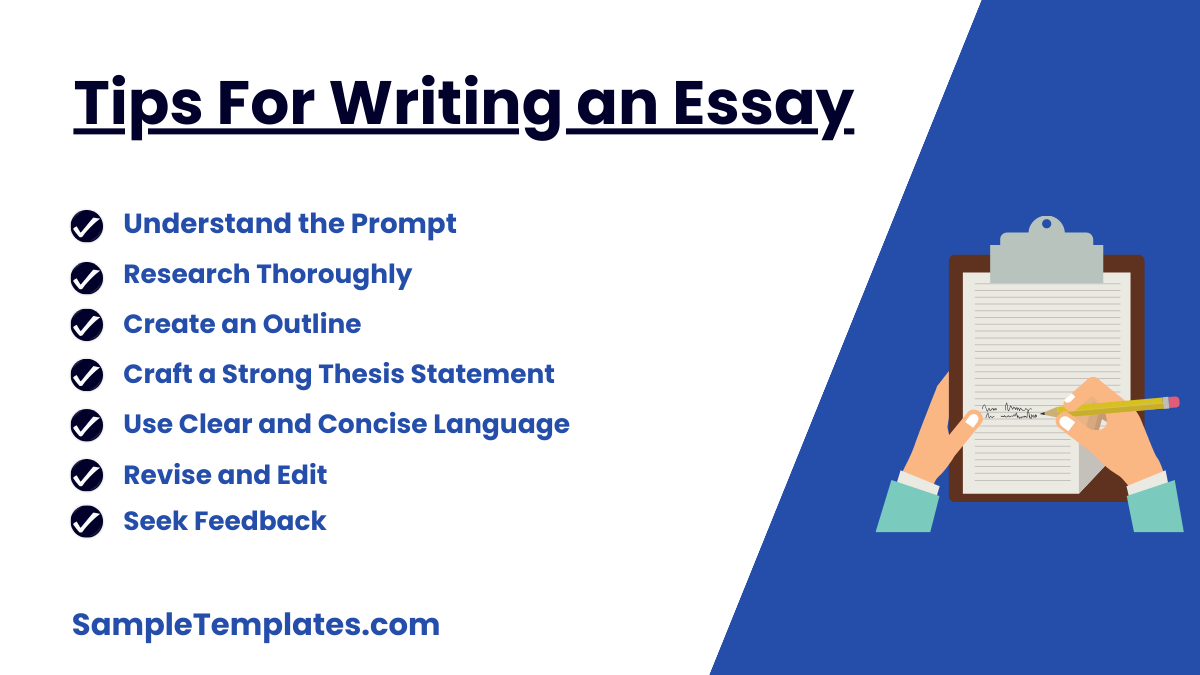
- Understand the Prompt: Before you begin writing, make sure you fully understand the essay prompt or question. Identify key words and phrases that dictate the style and content required, such as “analyze,” “compare,” or “discuss.”
- Research Thoroughly: Gather information from reliable sources to build a solid foundation for your essay. Use academic journals, books, and reputable websites to ensure your essay is informed and factual.
- Create an Outline: Plan the structure of your essay by creating an outline. This should include an introduction that introduces the topic and your thesis statement, body paragraphs that support your thesis with evidence and analysis, and a conclusion that summarizes your main points and restates the thesis in light of the evidence presented.
- Craft a Strong Thesis Statement: Your thesis statement in pdf should clearly express the main argument or point of your essay. It serves as the foundation upon which your essay is built, guiding the direction and focus of your writing.
- Use Clear and Concise Language: Write in a clear, concise manner, avoiding overly complex sentences or jargon that could confuse readers. Aim for clarity in your argumentation and coherence in your ideas.
- Incorporate Evidence and Analysis: Support your claims with evidence from your research, and analyze this evidence to explain how it supports your thesis. Be sure to properly cite your sources to avoid plagiarism.
- Revise and Edit: After completing your first draft, take the time to revise and refine your essay. Focus on improving the flow, clarity, and coherence of your writing, as well as correcting grammatical errors and typos.
- Seek Feedback: Don’t hesitate to seek feedback from peers, instructors, or writing centers. Constructive criticism can provide valuable insights into how to improve your essay before final submission.
By following these tips, you can enhance the quality of your essays, making them more persuasive, engaging, and well-researched.
Blank Essay Outline Example
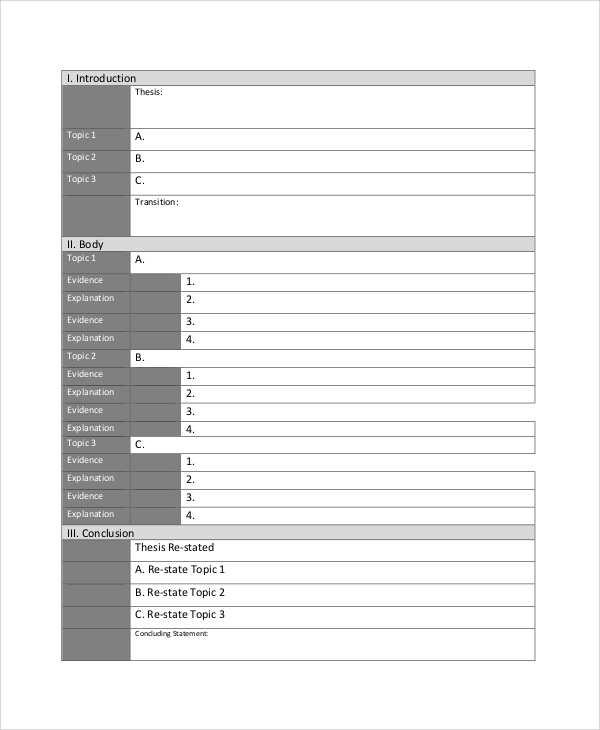
Details
File Format
Size: 36 KB
DownloadExample of Thesis Essay Format
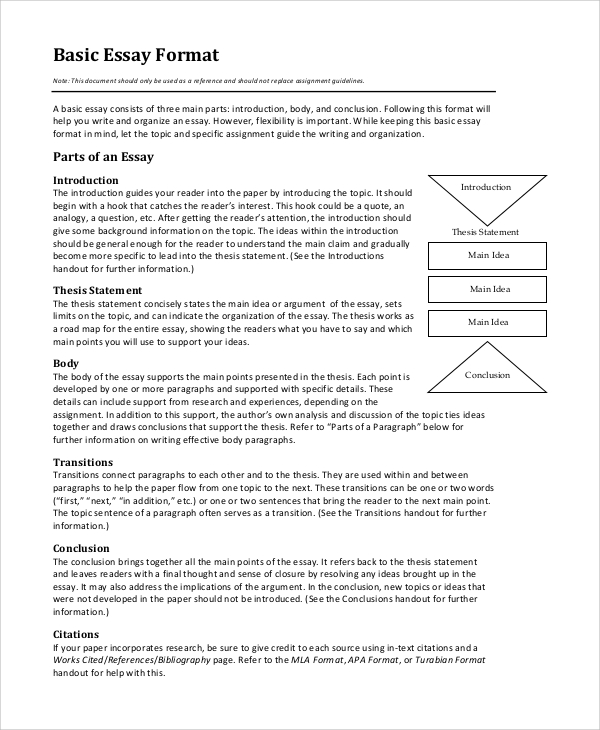
Details
File Format
Size: 121 KB
DownloadHow long is an essay?
The length of an essay can vary, but it typically ranges from 300 to 500 words for a standard essay, while longer essays or academic papers may exceed 1,000 words.
What does a good essay look like?
A good essay is well-organized, with a clear introduction, body paragraphs supported by evidence, and a conclusion that summarizes key points and reinforces the thesis, all written with clarity and coherence.
How many paragraphs in an essay?
An essay typically consists of three main parts: an introduction, body paragraphs (usually three or more), and a conclusion. Each paragraph serves a specific purpose statement in conveying the overall message or argument.
How do you begin a essay?
Begin your essay with an engaging introduction that grabs the reader’s attention, provides context for your topic, and presents a clear thesis statement outlining the main argument or purpose of your essay.
Does essay have a title?
Yes, essays often have titles. A well-crafted title can provide a glimpse into the essay’s theme or focus, enticing readers to engage with the content.
So what are you waiting for? We have a large variety of essay outline examples that will enable you to write out the emotions and opinions that drive you, and display the intensity with which you think about them. These Scholarship Essay Examples will surely aid you in conveying your thoughts across.
If you have any DMCA issues on this post, please contact us.
Related Posts
FREE 10+ Character Outline Samples in PDF
FREE 10+ Podcast Outline Samples in PDF
FREE 10+ Novel Outline Samples in PDF
FREE 10+ Chapter Outline Samples in MS Word | Google Docs | Pages | PDF
FREE 10+ Restaurant Income Statement Samples [ Proforma, Monthly, Projected ]
FREE 10+ Autobiography Outline Samples in MS Word | PSD | AI | Publisher | Pages | Indesign | PDF
FREE 10+ Exhibition Proposal Outline Samples in MS Word | Google Docs | PDF
FREE 10+ Feasibility Study Outline Samples [ Course, Content, Engineering ]
FREE 10+ Demonstrative Speech Outline Samples in PDF | DOC
FREE 10+ Meeting Outline Samples in PDF | MS Word
FREE 5+ Sample Cover Letter Outline Templates in PDF
FREE 8+ Sample Resume Outline Templates in PDF | MS Word
News Report
Written Warning
Teacher Lesson Plan
